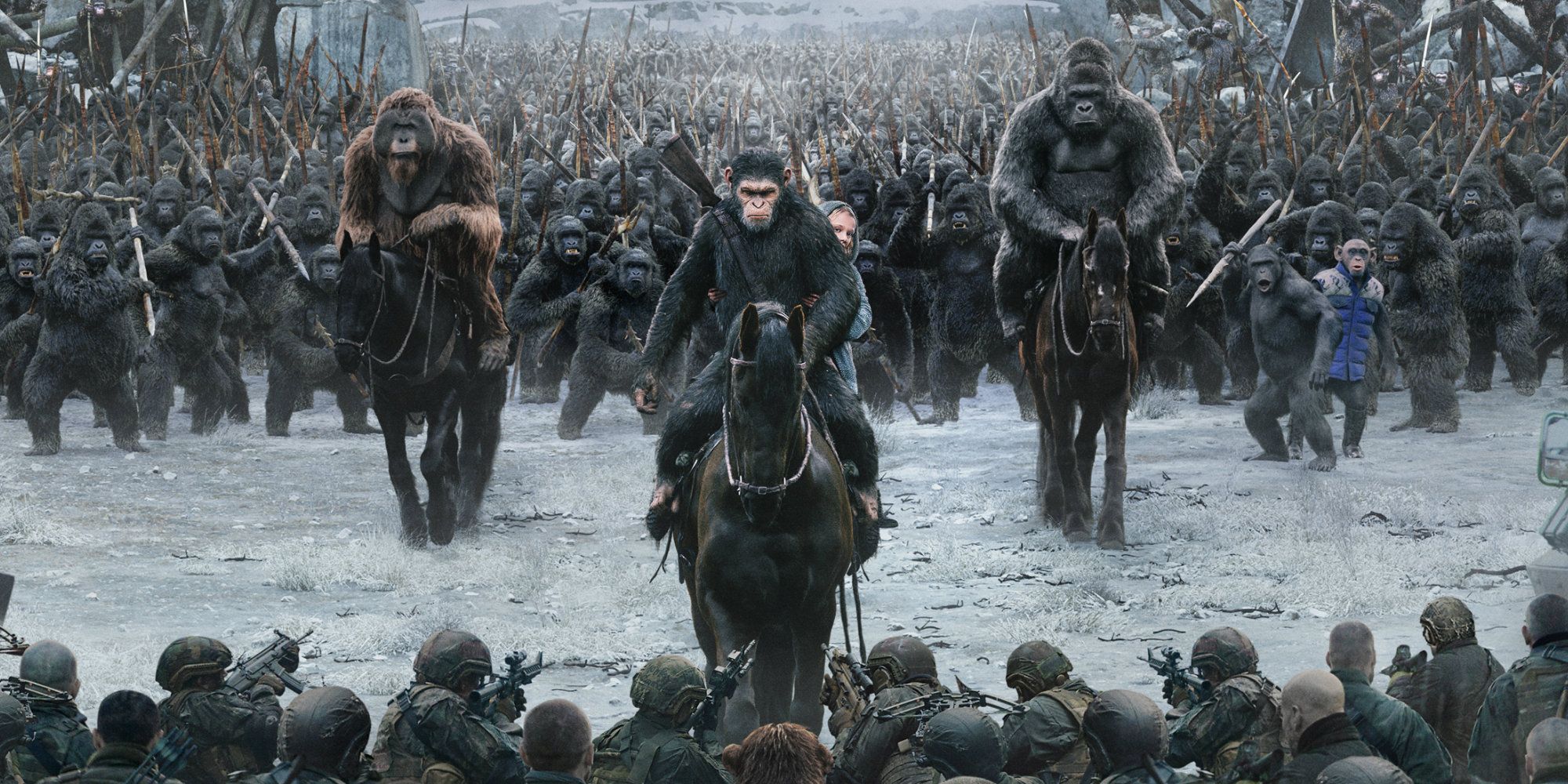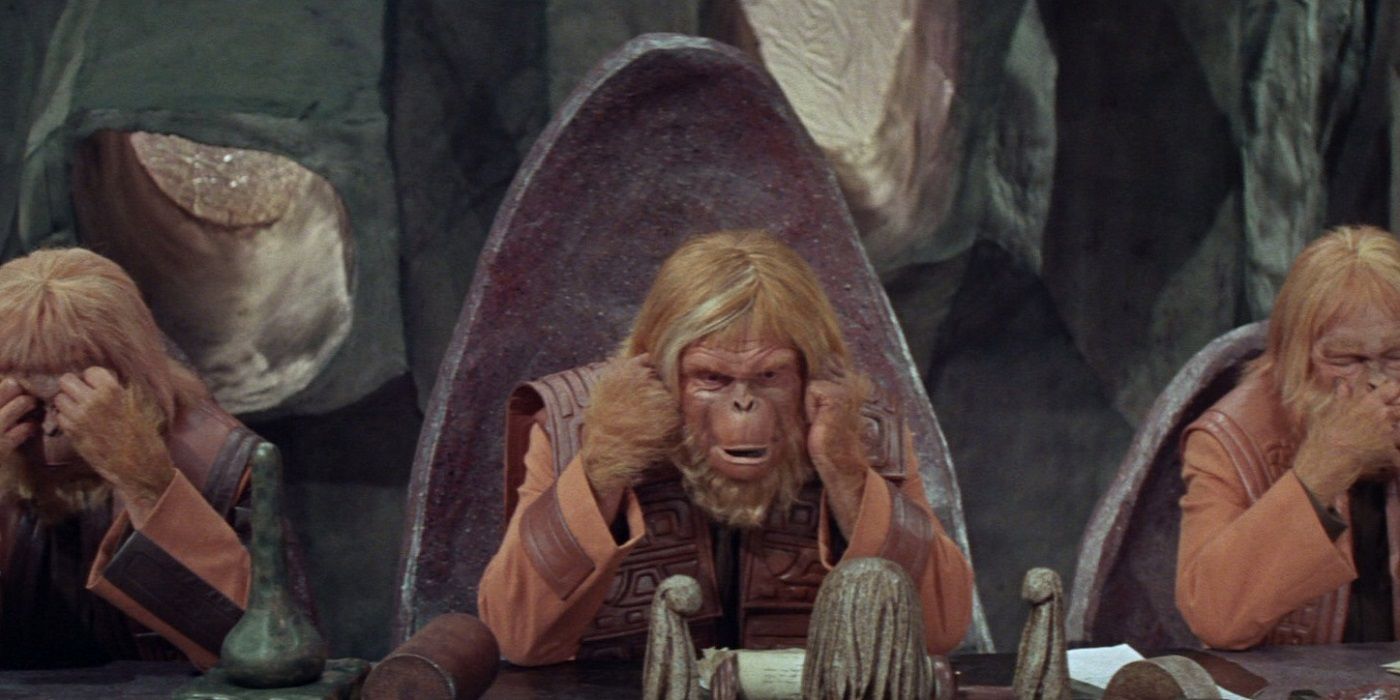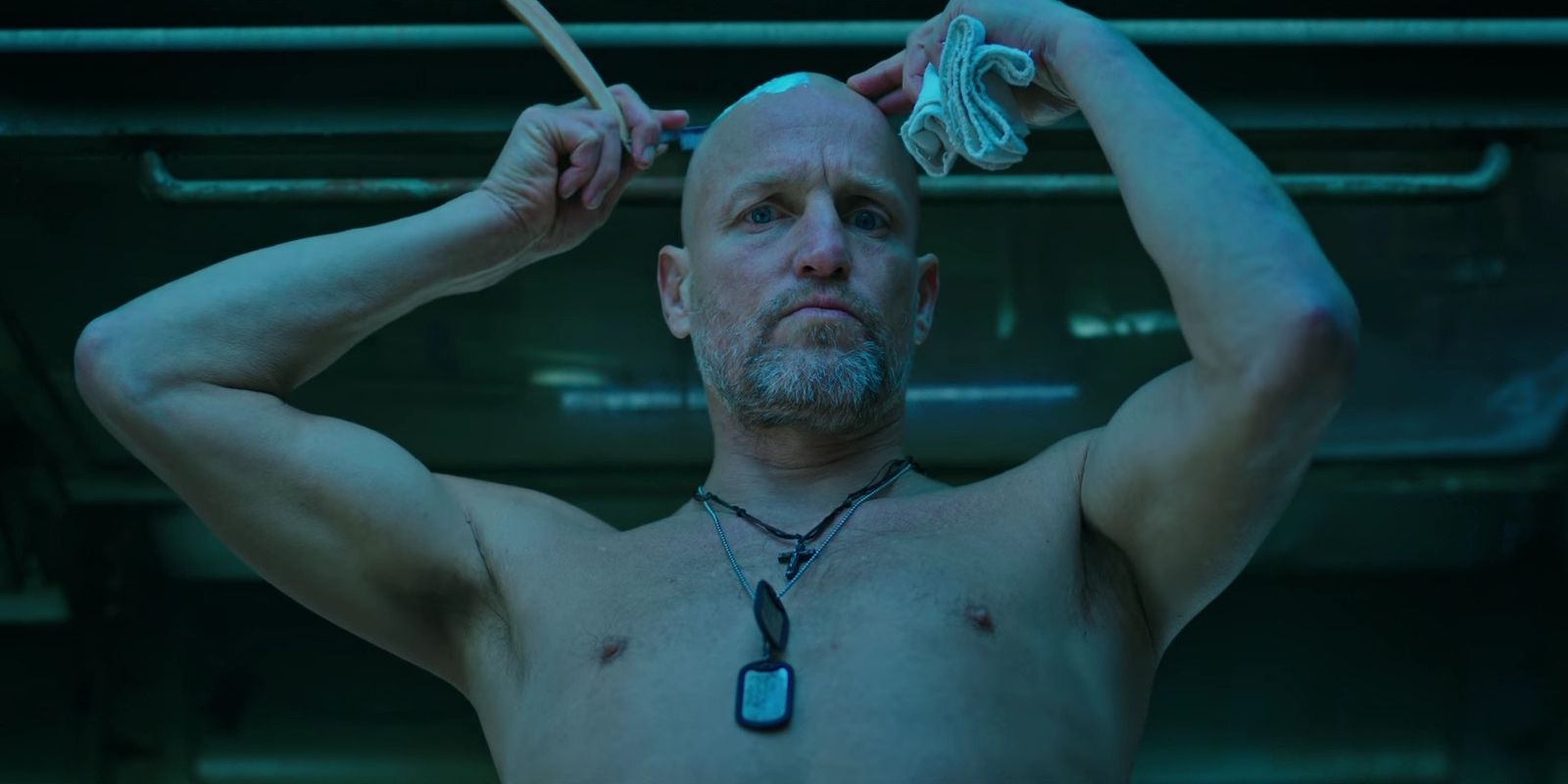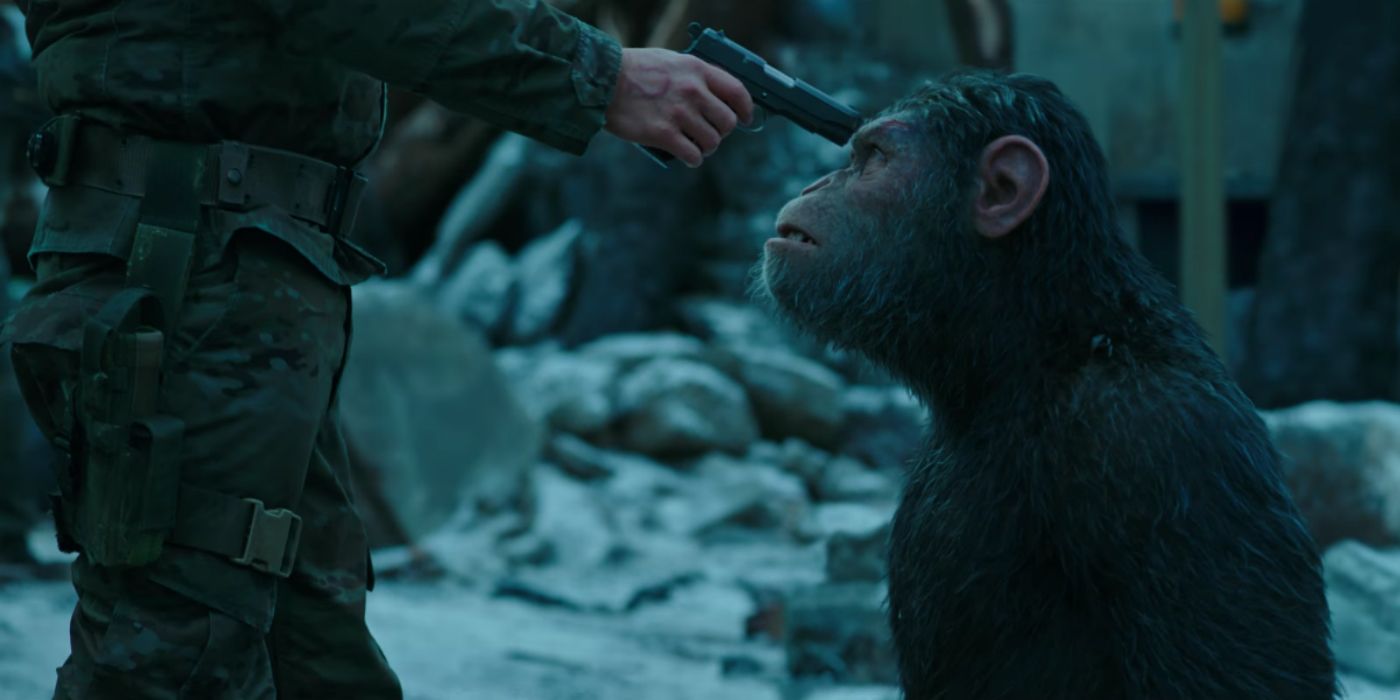Warning: SPOILERS ahead for War for the Planet of the Apes
-
Let's get one thing out of the way right up front: The Planet of The Apes franchise has always been political, and not just in the way that any story about dystopian societies are innately political. From the start, the Apes films (with the possible exception of the non-canonical Tim Burton-directed installment) have made an extra effort to frontload their narratives with pointed messages that often addressed the most controversial social topics of their day; in keeping with the common focus of the sci-fi genre of the era on using fantastical themes (see also: the original Star Trek, The Twilight Zone, etc) to symbolically explore real-world topics.
The original film satirized the then still-controversial evolution debate and touched on themes of slavery, class and government corruption. The sequel (Beneath The Planet of The Apes) was a bleak warning about the dangers of a nuclear holocaust. Escape From The Planet of The Apes, the third installment, starts out as a fish-out-of-water comedy but shifts into a grim allegory for persecuted immigrant families. Conquest of The Planet of The Apes (part 4) was a barely-concealed message-movie about then-recent "race riots" that came down so firmly on the side of the rioters that the studio ordered extra dialogue be added to the finale for fear of being seen as directly inciting violence. Even the much-maligned fifth film, Battle For The Planet of The Apes, is fixated on questions of who gets to write history - and why.
Now, with the release of War for the Planet of the Apes we've come to the end of this "prequel trilogy;" which began as an animal rights parable in Rise of The Planet of The Apes, continued into a "can't we all just get along?" culture-clash allegory (spoiler: we could not) and now concludes with a post-apocalyptic revenge drama that segues into a pitch-dark P.O.W. concentration-camp saga... that's also very much about white-hot present-day controversies surrounding immigration, national-identity, racism, culture-clashes and (maybe) certain specific real-world political leaders.
In case you need a refresher course on the property: The Rise/Dawn/War prequel trilogy aims to provide a modernized backstory for how the world gets to the smart talking apes/mute de-evolved humans scenario seen in the original series. In the new narrative, a biologically-engineered retrovirus originally designed as part of a cure for Alzheimer's Disease had a side-effect of granting human-level intelligence to an ape named Caesar (Andy Serkis) who, after witnessing and suffering abuse of apes by humans, used the virus to give others intelligence like his and led an ape uprising on the American West Coast. Some time later, the virus itself mutated and became lethal - utterly devastating the human population of Earth as Caesar's tribe of intelligent apes grew more powerful and numerous at the same pace.
War finds the two species at what feels like the end of their conflict, with Caesar's now nomadic migrant population of Apes beset by a powerful new enemy in the form of Woody Harrelson's Colonel McCullough - a military demagogue leading what he claims is the last human army in an offensive assault on Caesar and the apes. When things get personal, Caesar opts for a mission of revenge but, in the process, makes a series of startling discoveries: The virus has mutated once again, now causing the loss of speaking-ability in an increasing number of humans. Moreover, the Colonel doesn't necessarily have the rest of humanity behind his solutions - which involve (most publicly) rounding up the Apes while Caesar is distracted by his quest and putting them to work in his army/cult's forced labor camp.
Next Page: [valnet-url-page page=2 paginated=0 text='An%20Allegory%20for%20White%20Nationalism']
That the Colonel is, in fact, acting alone looks to be the crux of the film's very particular political edge. Depicting Caesar and his crew as a (literal) migrant population frames them as stand-ins for beleaguered and persecuted immigrant populations of the present day world; and you don't need to see Harrelson making a morning ritual of shaving his head or leading his troops in Nazi-esque marching formations to grasp the connection being drawn between his Ape-hating militia and present-day incarnations of the same tied to so-called "White Nationalist" movements in the United States and Europe.
Granted, there are few "pro-Ape" humans in this scenario, but the point comes home again and again that while Caesar has no interest in "enslaving" (or having anything to do with, really) the human race, the Colonel is specifically animated by fears of humanity being outnumbered. His religiously-tinged rantings to his followers on the subject echo the White Nationalist conspiracy meme of "White Genocide;" a hashtag-ready turn of phrase that refers not to actual "genocide" but rather the notion of white citizens becoming demographic minorities in "their own" nations because of (among other things) increased immigration in the emerging era of global citizenship. Toned-down variations on many of those same themes were also frequently alleged, by opponents, to exist in the subtext of heavily-nationalistic campaign rhetoric espoused by politicians like Marie La Penn in France and U.S. President Donald Trump in recent years.
To be clear: The filmmakers of War For The Planet of The Apes haven't explicitly said that their story, however clearly tied to these present-day topics, is (or isn't) meant to remind us of any paticular politician or movement. But if you were to go looking for a more specific political parallel being drawn for the Colonel, it might be his forced-labor needs are centered on establishing an artillery barricade that he more simply refers to as "The Wall" - and he's making the detained migrant Apes build it for him. Oh - and like any classical demagogue, the Colonel is also an abject moral hypocrite: For all his bluster about preserving the human race, he's a straight-up eugenicist aiming to exterminate fellow humans carrying the speech-robbing virus along with the Apes.
It's that aim that has brought a global army to his doorstep to wrest control of the situation from him - not, as Caesar at first erroneously believes, to join his cause. This allows the film to pull a sly, subversive twist on the audience (the "War" of the title isn't Ape vs. Man but two factions of humanity wiping each other out over how to "deal with" the Apes, who just want to be left alone); but it also puts yet another level of potential present-day specificity to the overriding allegory: The Colonel isn't simply a nationalist but an isolationist, eager to reject the will of the rest of the world in order to an "America (whatever's left of it) First"-style war policy. And that's a particular combination of ideological identifiers that makes it hard not to see the film casting it's ultimate villain as one "side" of several pressing present-day political dust-ups.
War for the Planet of the Apes is absolutely a "political movie" - as is every other film in the series and, if we're being honest, any sci-fi film that approaches allegory as storytelling device. The relevant question will be how it's political point-making is received both by a domestic audience as divided as at any time in recent history and global film audiences who often process such messaging in entirely different (sometimes unintended) ways... and what the filmmakers have to say those same audiences start asking what they were "meant" to take away from their work.





